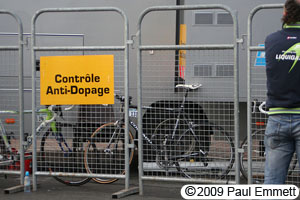 The doping controls during this year’s Tour de France will be implemented without the help of the French anti-doping agency (AFLD), said International Cycling Union (UCI) President Pat McQuaid Saturday.
The doping controls during this year’s Tour de France will be implemented without the help of the French anti-doping agency (AFLD), said International Cycling Union (UCI) President Pat McQuaid Saturday.
The two agencies had a falling out which erupted last October when the AFLD released a report that accused the UCI of giving preferential treatment to race winner Alberto Contador’s Astana team. The UCI responded saying the report was “unfounded”, and in the future would seek a “neutral” partner for doping tests carried out in France.
“The UCI did not actually need the services of AFLD. The role of the AFLD according to the agreement was modest,” explained the UCI at the time. “In short, they provided the doctors to assist our Doping Control Officers. The UCI also agreed to collaborate on targeted testing before and during the event, based on our respective information sources.
“While the UCI Anti-Doping programme always welcomes independent and professional scrutiny, the AFLD did not seek that role in the agreement with the UCI.
“The AFLD’s unilateral decision to conduct an informal observer programme, with the unfortunate result of an untimely, incomplete, misinformed and inaccurate report is puzzling and disappointing. It calls into question the motives of AFLD,” the UCI noted.
“Now that the Tour is over, it is even more evident that Astana received absolutely no special treatment, except in the sense of their riders being subject to considerably more doping controls than other riders,” the UCI continued.
“In fact the top individual Astana riders received more than three times the number of tests of most other riders in the race.”
With bad blood still boiling between the two organizations, the UCI announced that they will now work with the World Anti-Doping Agency (WADA) this coming July.
“Employees of WADA will work during the Tour and accompany the UCI inspectors,” McQuaid explained from Australia, where he is attending the Santos Tour Down Under.